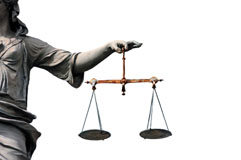 If you have completed studying the English Legal System on ILSPA's Legal Secretaries Diploma Course, you will be aware that the two main branches of the legal profession are solicitors and barristers. These parts of the profession work together in some cases to ensure the best chance of success. When it is appropriate to use a barrister, the barrister is sent ‘Instructions' (when asked to give an opinion on a case) or a 'Brief' (if the barrister is to appear in court). Good instructions should give background on a case and will generally include the following:
If you have completed studying the English Legal System on ILSPA's Legal Secretaries Diploma Course, you will be aware that the two main branches of the legal profession are solicitors and barristers. These parts of the profession work together in some cases to ensure the best chance of success. When it is appropriate to use a barrister, the barrister is sent ‘Instructions' (when asked to give an opinion on a case) or a 'Brief' (if the barrister is to appear in court). Good instructions should give background on a case and will generally include the following:
- Who you are and whom you act for
- Who your dispute or potential dispute is with, and the nature of it (e.g. ‘unfair dismissal claim by former employee’ or ‘boundary dispute’)
- A brief background which usually sets out the relevant events in chronological order
- Any relevant deadlines (e.g. limitation dates, hearing dates or time limits for serving evidence)
- What you want the barrister to do
There are no set rules on how the instructions or briefs should appear or what papers should be sent. However, where you are asking counsel to draft pleadings or appear in court, you should consider the following additional points:
Drafting - You may want counsel to review witness statements or other statements of case to best present the evidence to the court. In this case you should send all relevant expert reports, correspondence, emails, draft statements, photographs, plans, videos, etc. A careful selection of papers rather than a copy of the file is likely to help counsel focus on the critical issues.
Hearings - Counsel will need a copy of the claim form, particulars, witness statements, a court bundle paginated and a spare copy (if senior and junior counsel are to be used). Counsel also should be given any details of previous settlement discussions and instructions about counsel’s authority to settle the matter.
The paperwork is usually sent to the barrister’s clerk, who will advise on availability and costs. All the documents you send should be copies, not originals, as barristers do not usually have the means to safely store large amounts of documentation.
If a case does need counsel to be instructed, you will need to get the client’s agreement and (if possible) money. Once a barrister has been instructed, it is the responsibility of the solicitor’s firm to pay the barrister’s bill. In the case of Sibley & Co -v- (1) Reachbyte Limited (2) Kris Motor Spares Limited [2008] EWHC 2665 (ChD), the appeal judge reduced the solicitors’ bill by £131,840. This decision was based on the fact that the solicitors did not get clear instructions from the client or money for the barrister’s bills up front.
It has been possible since 2004 for members of the public to instruct barristers directly (known as the ‘direct access scheme’). However, there has not been a large take-up of this scheme by the public. This may be in part because of all the work that goes into instructing counsel properly. It could also be because solicitors are in a better position to decide if a particular barrister has the right experience, qualification and good reputation to deal with a case. Finally, it might be a simple matter of costs. Although a client may be paying two lawyers, the solicitor will be in a better position to monitor counsel’s fees.
Obviously some of the steps outlined above will be taken by the fee earner in the case, but as that person’s secretary you can greatly assist him or her. You may be helping to identify and copy documents or checking to see what money the client has paid on account. It may be that you are asked to check or help maintain the firm’s register of suitable experts, which will often include local barristers. Whatever steps of the process you take, it will be a great benefit to your fee earner.

